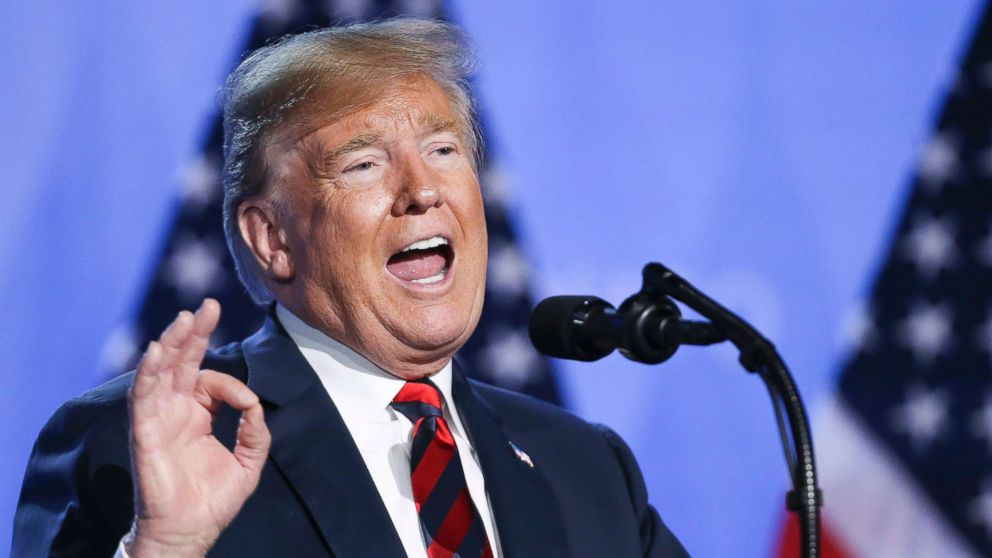Lawmakers, experts doubt Trump could unilaterally pull US from NATO
President Donald Trump's contention during his Brussels news conference Thursday that he "probably can" pull the U.S. from NATO without congressional approval has resurfaced questions about whether the president has the political and constitutional power to do so.
Since his inauguration, President Trump has indeed taken advantage of opportunities to wield his executive powers on major foreign policy decisions such as withdrawing the U.S. from the Iran nuclear deal and the Paris Agreement on climate change. But an attempt to withdraw from NATO, experts say, could bring an extensive fight not only with Congress but with the courts as well.
While Trump also said he believed it would be "unnecessary" to withdraw due to what he said were new commitments from allies to raise their defense spending levels, lawmakers on Thursday appeared largely united in their belief that the president should not try to unilaterally withdraw from NATO.
“No. He would need Congress with him, certainly,” Sen. Jeff Flake, R-Ariz., told ABC.
“I think it would be a mistake, so I don't see that as a realistic likelihood,” Sen. John Cornyn, R-Texas, said.
Even as most members of Congress would no doubt be against him, whether Trump has the authority to do so is a murkier question.
Mary Ellen O'Connell, a professor of Law and International Dispute Resolution at the University of Notre Dame told ABC News that the Constitution makes clear that the president needs Congress to create a treaty, but it's less clear about whether a president can dismantle one.
"The Constitution is silent respecting withdrawal," O'Connell said. "Presidents have consistently interpreted this silence to mean that he may withdraw under his foreign affairs power without the need for Senate approval."
Specifically, previous examples of the U.S. abrogating treaties include former President George W. Bush's decision during his administration to withdraw the U.S. from the 1972 Anti-Ballistic Missile Treaty (ABM) and former President Jimmy Carter's decision to withdraw from the Mutual Defense Treaty with Taiwan.
In the case of the ABM treaty, House lawmakers in 2002 actually sought to sue the Bush administration over the withdrawal but the lawsuit was dismissed by a federal judge who said: "issues concerning treaties are political questions best left to the political branches of the government, not the courts."
But former Democratic Sen. Russ Feingold, who at the time sought to involve himself in the legal fight against the Bush administration, said that previous court ruling might not hold up when it comes to NATO.
"Most legal scholars think that the state of the law means that the president could put out a tweet in the morning and pull us out in the afternoon," Feingold said. "I do think that's where it sits, but if it happened I think there would finally be a legal challenge on the merits that the Supreme Court would have to consider."
According to Damon Wilson, a former official in the Bush administration who now serves as Executive Vice President on the Atlantic Council, an attempt to withdraw from NATO would pose a wildly different set of issues than the Bush withdrawal from the ABM.
"We went through a formal process of notification, of announcement, of complying with the provision of the treaty that provided for abrogation and that was built into it," Wilson said. "The NATO treaty isn't written that way, it's more simplistic, it's not an arms control document with 62 provisions."
Wilson disputed that the president would be able to simply proclaim that the U.S. is no longer a member of NATO, pointing specifically to Article 13 in the treaty itself that states any government wishing to withdraw must give one year's notice to the United States.
"The United States would essentially have to legally inform itself and give a one year notice that it's going to withdraw," Damon said. "That's a legal provision. The reality is President Trump would have a revolt on his hands – you have this U.S. Senate and even the next US Senate that would not accept that."
In a move that underscores the extent of Senate support for NATO, earlier this week the body passed, 97-2, a nonbinding measure that urged negotiators over the annual defense policy bill to reaffirm the United States’ commitment to NATO and its obligations of mutual self-defense as enumerated in Article 5.
The Senate Foreign Relations Committee also unilaterally approved a separate provision, also nonbinding, expressing support for the strategic importance of NATO to the United States.
“A strong NATO, especially given a level of aggression from Russia not seen since the Cold War, remains essential for maintaining the rules-based international order,” the committee chairman, Republican Bob Corker, said after his panel approved the resolution.
The more pressing potential threat to NATO, experts warned, is President Trump's potential ability to undermine longstanding commitments if he's not satisfied with member contributions.
Just Thursday, the president would not rule out the cancellations of U.S. participation in NATO military exercises in the Baltic region, intended as a show of strength on the frontline of defense against Russia.
"The question now is, in two years or three years, what will NATO be pursuing with the United States not playing its traditional leadership role in the alliance?" said Julianne Smith, a former deputy national security adviser to Vice President Biden and senior fellow at the Center for a New American Security. "Nobody provides more leadership in this alliance than the United States. And you can feel it when you go over there around the halls of NATO and you talk to people. They're not sure they can do and achieve what NATO's capable of without a strong U.S. partner."




